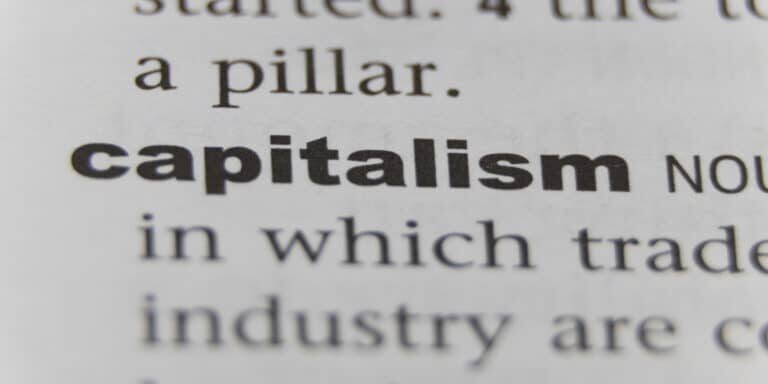
Capitalism is About Exchange, Not Exploitation
In our modern political culture, many people claim that profits are the outcome of some individuals exploiting other individuals. Hence, anyone who is seen trying to make profits is regarded as an enemy of society and must be stopped before inflicting damage. According to Henry Hazlitt, “The indignation shown by many people today at the mention of the very word profits indicates how little understanding there is of the vital function that profits play in our economy.”
Furthermore, Hazlitt held,
In a free economy, in which wages, costs and prices are left to the free play of the competitive market, the prospect of profits decides what articles will be made, and in what quantities—and what articles will not be made at all. If there is no profit in making an article, it is a sign that the labor and capital devoted to its production are misdirected: the value of the resources that must be used up in making the article is greater than the value of the article itself. One function of profits, in brief, is to guide and channel the factors so as to apportion the relative output of thousands of different commodities in accordance with demand.
Profit, therefore, has nothing to do with exploitation; it is about the most efficient use of individuals’ means. Instead, profit should be seen as an indicator of whether means are employed in the best possible way.
If the employment of means results in the expansion of wealth, all other things being equal, this demonstrates employment was done in a profitable manner. Conversely, a decline in the pool of wealth is indicative of a loss, which shows a squandering of means.
Rather than being condemned, people who are instrumental in expanding wealth, which is manifested by profits, should be praised. These individuals are instrumental in raising the living standards of the population as a whole.
Profit can be gained only in a market economy in which prices of goods and factors of production can be established. Needless to say, the existence of money determines the prices of goods and factors of production. The exchange rate of goods and factors of production are expressed in terms of money (i.e., the amount of money per unit of good or factor unit).
Profit emerges once an entrepreneur discovers that the prices of some factors are undervalued relative to the potential value of the products that these factors, once employed, could produce. By recognizing the discrepancy and acting upon it, an entrepreneur removes the discrepancy, thus also eliminating the potential for further profit.
According to Murray Rothbard, every entrepreneur invests in a process because he expects to make a profit and believes that the market has underpriced and undercapitalized the factors in relation to their future rents. For an entrepreneur to make profits, he must plan and anticipate future consumer preferences. Hence, those entrepreneurs who excel in forecasting consumers’ future preferences will make profits, all other things being equal.
In order to be ready for consumers’ future requirements, businesses allocate at present various means toward generating the infrastructure that will enable them to accommodate the consumers’ future demands. Planning and research, however, can never guarantee that profits will be secured—various unforeseen events can upset entrepreneurial forecasts. Errors, which lead to losses in the market economy, are an essential part of the navigational tools which direct the process of allocating means in an uncertain environment in line with what consumers dictate.
Some commentators regard profit as a reward for risk-taking. In the words of Ludwig von Mises, however,
A popular fallacy considers entrepreneurial profit a reward for risk taking. It looks upon the entrepreneur as a gambler who invests in a lottery after having weighed the favorable chances of winning a prize against the unfavorable chances of losing his stake. This opinion manifests itself most clearly in the description of stock exchange transactions as a sort of gambling.
Mises then suggests,
Every word in this reasoning is false. The owner of capital does not choose between more risky, less risky, and safe investments. He is forced, by the very operation of the market economy, to invest his funds in such a way as to supply the most urgent needs of the consumers to the best possible extent.
Mises then adds, “A capitalist never chooses that investment in which, according to his understanding of the future, the danger of losing his input is smallest. He chooses that investment in which he expects to make the highest possible profits.”
Furthermore, an investor who is preoccupied with risk rather than identifying profit opportunities is likely to undermine himself. On this Mises wrote,
There is no such thing as a safe investment. If capitalists were to behave in the way the risk fable describes and were to strive after what they consider to be the safest investment, their conduct would render this line of investment unsafe and they would certainly lose their input.
Hence, an entrepreneur’s return on his investment is determined not by how much risk he assumes but rather whether he complies with consumers’ wishes. Again, for a businessman, the ultimate criteria for investing his capital is to employ it in those activities which will produce goods and services that are on the highest priority list of consumers. It is this striving to satisfy the most urgent needs of consumers that produces profits.
In a market system, consumers move production activities to the hands of those who are best fit to serve them. Henceforth, policies that curtail or confiscate profits impair this function. In an environment of government and central bank interference, the distortion of prices makes it harder to establish whether businesses are making profits. As a result, it becomes difficult to discern wealth-generating activities from non-wealth-generating activities.
Profits are not the result of exploitation but emerge when entrepreneurs accommodate consumers’ wishes in the best possible ways. For an entrepreneur to make profits, he must anticipate consumer preferences. Consequently, entrepreneurs who excel in their forecasting of consumers’ future preferences are more likely to be profitable.
This article originally appeared on the Mises Institute
sign up for the newsletter
By signing up, you agree to our Privacy Policy and Terms of Use, and agree to receive content that may sometimes include advertisements. You may opt out at any time.












